Featured Articles Archive
Friendly Beasts Capture Our Sanctuary
 Sunday, December 18, to the delight of congregants at the 9 and 11 am services, 35 children, costumed as brown donkeys, red and white cows, dogs, doves, and mice, sang “The Friendly Beasts” song. The children, from our Religious Education (RE) program, were participating in UU Santa Monica’s 23rd annual Holiday Pageant. The backstory: The animals courteously left the barn during the birth of Jesus, then reentered it to greet the infant in song.
Sunday, December 18, to the delight of congregants at the 9 and 11 am services, 35 children, costumed as brown donkeys, red and white cows, dogs, doves, and mice, sang “The Friendly Beasts” song. The children, from our Religious Education (RE) program, were participating in UU Santa Monica’s 23rd annual Holiday Pageant. The backstory: The animals courteously left the barn during the birth of Jesus, then reentered it to greet the infant in song.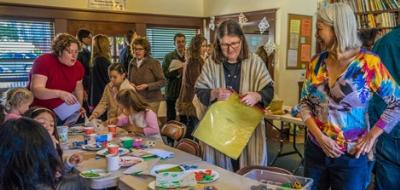 The performance — and the six weeks of rehearsals that preceded it — was led by Kris Langabeer, who has produced and conducted the Friendly Beast song in all 23 of these pageants. She and the kids were ably assisted by parents and other adult congregants getting the beasts in and out of costumes and to the right places at the right times, adult congregants acting the parts of Mary and Joseph, and older youth acting as shepherds. The wise men were very young children who rode in on the shoulders of parents.
The performance — and the six weeks of rehearsals that preceded it — was led by Kris Langabeer, who has produced and conducted the Friendly Beast song in all 23 of these pageants. She and the kids were ably assisted by parents and other adult congregants getting the beasts in and out of costumes and to the right places at the right times, adult congregants acting the parts of Mary and Joseph, and older youth acting as shepherds. The wise men were very young children who rode in on the shoulders of parents.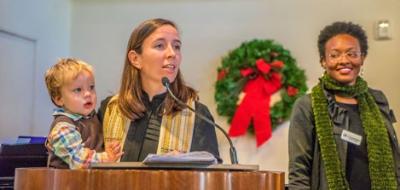 Rev. Rebecca Benefiel Bijur, Director of Religious Education Kathleen Hogue, and Director of Music Dr. Zanaida Robles were the worship leaders for the overall services, entitled “The Spirit of the Christmas Tree.” Dr. Robles led the congregation in singing a song by the same name and several other songs, her soprano voice radiating — and eliciting — joyous energy. Rev. Rebecca noted that Jesus is celebrated by Muslims as well as by Christians [and he was, of course, Jewish]. Ms. Hogue narrated a story for all ages about a young boy, previously made fun of by his peers because of his exceptional height, who is embraced by them when he is the only one who can place the ornament atop the class Christmas tree. The story goes deeper; the boy draws the scene, his mother and father see aspects of the drawing other than their son placing the star, the disappointed boy shows the drawing to his perceptive and wise grandmother, and…lifelong lessons are learned.
Rev. Rebecca Benefiel Bijur, Director of Religious Education Kathleen Hogue, and Director of Music Dr. Zanaida Robles were the worship leaders for the overall services, entitled “The Spirit of the Christmas Tree.” Dr. Robles led the congregation in singing a song by the same name and several other songs, her soprano voice radiating — and eliciting — joyous energy. Rev. Rebecca noted that Jesus is celebrated by Muslims as well as by Christians [and he was, of course, Jewish]. Ms. Hogue narrated a story for all ages about a young boy, previously made fun of by his peers because of his exceptional height, who is embraced by them when he is the only one who can place the ornament atop the class Christmas tree. The story goes deeper; the boy draws the scene, his mother and father see aspects of the drawing other than their son placing the star, the disappointed boy shows the drawing to his perceptive and wise grandmother, and…lifelong lessons are learned.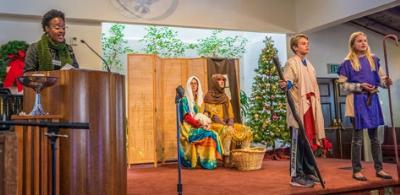
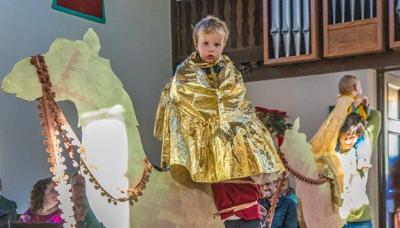

The Joy of Generosity - Thanks to Those Who Have Pledged for 2017
 Many thanks to all members and friends who have already sent in their 2017 pledges, who are listed below. Your pledges will help keep our church, and its ministry and programs, thriving this year and for years to come.
Many thanks to all members and friends who have already sent in their 2017 pledges, who are listed below. Your pledges will help keep our church, and its ministry and programs, thriving this year and for years to come.
RIGHT RELATIONS TASK FORCE REPORT:
Right Relations through Change and the Power of Listening Circles
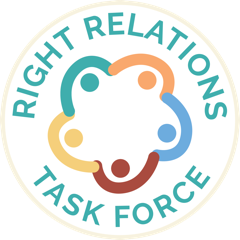 Being in right relations with one another is hard work, especially when we aren’t explicit about wanting to interact with one another in this manner. But as part of a faith community that values “justice, equity, and compassion in human relations,” as stated in our “UUA Covenant,” it is important that we strive to do this hard work explicitly and lovingly.
Being in right relations with one another is hard work, especially when we aren’t explicit about wanting to interact with one another in this manner. But as part of a faith community that values “justice, equity, and compassion in human relations,” as stated in our “UUA Covenant,” it is important that we strive to do this hard work explicitly and lovingly.Dining for Dollars: Don’t Miss Hosting and Bidding
You can sign up for hosting by using the web
Mark your calendars now for these auction dates
Feb. 19th and 26th, as our announcement states.
It’s Dining for Dollars, which makes us all cheer!
Not only did last year’s proceeds all-time excel,
The events that we had made us feel happy and well.
UUSM Communications in 2017: Join the Team
Quotations Related to Prophecy
Honoring the Reverend Rebecca Benefiel Bijur
YRUU Service Photo
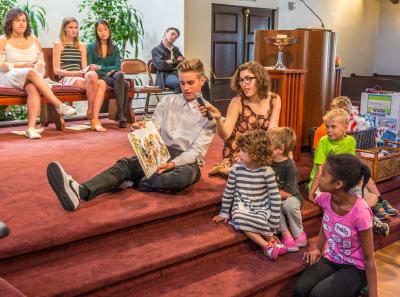
Teens from our Young Religious Unitarian Universalists (YRUU) group read the story during the intergenerational worship service on Sunday, April 30.
Rev. Greg Ward Introductory Sermon

Right Relations Task Force Report - Sharing Stories of Conflict Transformation at UUSM

“I overheard a church employee talking to a group of RE volunteers stating that she thought the Right Relations Task Force was not doing a very good job and was ineffective in moving the congregation forward. I took my concern to the Right Relations Task Force and it was suggested that I ask the employee about what I had heard. Upon speaking with the employee, I was told she was referring to another UU congregation. I apologized for the confusion and the conversation ended happily with a big hug.” – Tom Peters
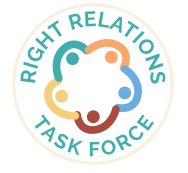 Stories of conflict transformation from a congregation may be examples from one-on-one encounters, interactions within groups, within formal structures of the congregation, in congregation program offerings, or in social situations such as coffee hour or fundraising events.
Stories of conflict transformation from a congregation may be examples from one-on-one encounters, interactions within groups, within formal structures of the congregation, in congregation program offerings, or in social situations such as coffee hour or fundraising events.
Pipes Lecture: “A 60/40 Case for Hope. I’ll Take Those Odds and So Should You”
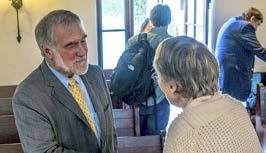 “When I was at Amnesty International, the question I was asked repeatedly for 12 years was simply this: ‘Given all the horror and carnage that you encounter in your work every day — torture, rape, murder — how do you retain any sense of optimism, of hope, about human nature and the human future?’”
“When I was at Amnesty International, the question I was asked repeatedly for 12 years was simply this: ‘Given all the horror and carnage that you encounter in your work every day — torture, rape, murder — how do you retain any sense of optimism, of hope, about human nature and the human future?’” Rev. Schulz, who also gave the inaugural Pipes Lecture, has served as president of the Unitarian Universalist Association, executive director of Amnesty International USA, and president and CEO of the Unitarian Universalist Service Committee. To answer the question, he looked first to history. He noted that 250 years ago in the U.S., slavery, the subjugation of women, and voting restricted to white males were the norm, whereas “today no reputable person would support” those practices nor oppose universal suffrage. He quoted radical journalist I. F. Stone: “The only kinds of fights worth fighting are those you are going to lose. Because somebody has to fight them and lose and lose and lose until the day when somebody who believes as you do finally wins.”
Rev. Schulz, who also gave the inaugural Pipes Lecture, has served as president of the Unitarian Universalist Association, executive director of Amnesty International USA, and president and CEO of the Unitarian Universalist Service Committee. To answer the question, he looked first to history. He noted that 250 years ago in the U.S., slavery, the subjugation of women, and voting restricted to white males were the norm, whereas “today no reputable person would support” those practices nor oppose universal suffrage. He quoted radical journalist I. F. Stone: “The only kinds of fights worth fighting are those you are going to lose. Because somebody has to fight them and lose and lose and lose until the day when somebody who believes as you do finally wins.”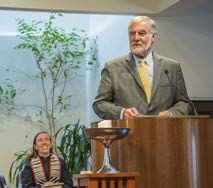 Acknowledging that contemplating the sweep of history may be too abstract to provide comfort, Schulz gave “two more practical reasons for hope in the human enterprise, both of which emerge from my observations of human beings.” His first observation was about human resilience. “What has always astonished me about those I have known who were victims of human rights abuses was that, if they survived death threats or years of unjust imprisonment or torture, it was because they never gave up. They endured greater suffering than you and I could ever imagine; they sustained deep wounds, often scarred for life both emotionally and physically, but time after time they were prepared to be re-engaged in the struggle for justice.” One example he gave was of a staff member at Amnesty International who, even after 20 years, could not speak without tears about having had two daughters kidnapped, become an effective and “outspoken advocate for other people’s human rights.”
Acknowledging that contemplating the sweep of history may be too abstract to provide comfort, Schulz gave “two more practical reasons for hope in the human enterprise, both of which emerge from my observations of human beings.” His first observation was about human resilience. “What has always astonished me about those I have known who were victims of human rights abuses was that, if they survived death threats or years of unjust imprisonment or torture, it was because they never gave up. They endured greater suffering than you and I could ever imagine; they sustained deep wounds, often scarred for life both emotionally and physically, but time after time they were prepared to be re-engaged in the struggle for justice.” One example he gave was of a staff member at Amnesty International who, even after 20 years, could not speak without tears about having had two daughters kidnapped, become an effective and “outspoken advocate for other people’s human rights.” “The resilience of the human spirit is so profound,” Schulz added, “that I would be guilty of the worst form of narcissism if I gave up hope in human transformation when so many others who have seen humanity at its worst have managed not to.… Few of us display that kind of resilience in the face of agony. But what large numbers of us are capable of feeling is another’s pain. If resilience is unusual, generosity is commonplace.”
“The resilience of the human spirit is so profound,” Schulz added, “that I would be guilty of the worst form of narcissism if I gave up hope in human transformation when so many others who have seen humanity at its worst have managed not to.… Few of us display that kind of resilience in the face of agony. But what large numbers of us are capable of feeling is another’s pain. If resilience is unusual, generosity is commonplace.”We Celebrate Minister Emeritus Ernie Pipe’s 90th Birthday! (And Discover the Bare Truth)
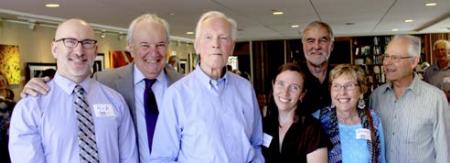 Forbes Hall was full Saturday afternon, October 22, for a celebration of the Rev. Ernie Pipes’ 90th birthday. Many of the UU Santa Monica members present had been in the congregation during Ernie’s 35-year ministry (1956–1991), had been friends with Ernie’s wife, Maggie, and had walked beside her in the fight for social justice. Several of the speakers at the “High Tea” spoke of the many weddings Ernie had performed in the decades during and after his ministry, including the first “committed unions” of same sex couples in California.
Forbes Hall was full Saturday afternon, October 22, for a celebration of the Rev. Ernie Pipes’ 90th birthday. Many of the UU Santa Monica members present had been in the congregation during Ernie’s 35-year ministry (1956–1991), had been friends with Ernie’s wife, Maggie, and had walked beside her in the fight for social justice. Several of the speakers at the “High Tea” spoke of the many weddings Ernie had performed in the decades during and after his ministry, including the first “committed unions” of same sex couples in California.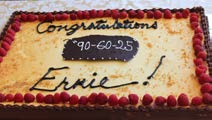 Starting with the Rev. Bill Schulz, former UUA president who gave the Pipes Lecture the following day, a number of speakers also made tantalizing references to Ernie having performed a wedding in the nude. After all the laudatory speeches had concluded, Ernie took the microphone and said that while he didn’t feel he merited such tributes, he nevertheless accepted them and thanked those who made them. Then, still the preacher providing clarity to his flock, he addressed the question of the hour. He said he had been called to perform a wedding ceremony at a nudist colony in Topanga Canyon. When he arrived and saw that the couple and everyone else were naked, he took off his clothes, because, “It would have been obscene” to perform the ceremony while dressed. Then it was time to cut the cake.
Starting with the Rev. Bill Schulz, former UUA president who gave the Pipes Lecture the following day, a number of speakers also made tantalizing references to Ernie having performed a wedding in the nude. After all the laudatory speeches had concluded, Ernie took the microphone and said that while he didn’t feel he merited such tributes, he nevertheless accepted them and thanked those who made them. Then, still the preacher providing clarity to his flock, he addressed the question of the hour. He said he had been called to perform a wedding ceremony at a nudist colony in Topanga Canyon. When he arrived and saw that the couple and everyone else were naked, he took off his clothes, because, “It would have been obscene” to perform the ceremony while dressed. Then it was time to cut the cake.Quotations Related to "Story"
Second Sunday...Second Debate
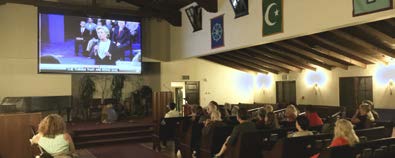
Right Relations Task Force Report: Two Listening Circles Took Place; More to Come
 The work of the Right Relations Task Force (RRTF) is in full swing. Our consultant, Nancy Edmundson, facilitated two pilot listening circles in Forbes Hall Saturday, October 1. We were excited that more than 30 church members participated in these initial efforts, while our RRTF members sat in an outer circle and, well, listened. Listening circles (previously called “listening dialogues”) are spaces for church members to share personal thoughts, feelings, and experiences as members of the church community, and to listen to the experiences and perspectives of others.
The work of the Right Relations Task Force (RRTF) is in full swing. Our consultant, Nancy Edmundson, facilitated two pilot listening circles in Forbes Hall Saturday, October 1. We were excited that more than 30 church members participated in these initial efforts, while our RRTF members sat in an outer circle and, well, listened. Listening circles (previously called “listening dialogues”) are spaces for church members to share personal thoughts, feelings, and experiences as members of the church community, and to listen to the experiences and perspectives of others.
How Much Joy Can You Generate?
You are invited to attend a Joy of Generosity house party this month
| HOST | DATE | LOCATION |
| Susan and Herb Stahl | Sat, Nov 5, 6 pm | North Santa Monica |
| Diane & Karl Fletcher Hoppe | Fri, Nov 11, 7 to 9 pm | Marina del Rey |
| Beth Brownlie & Bryan Oakes | Sat, Nov 12, 6 pm | West LA |
| Kim Miller & Mike Reivitis | Fri, Nov 18, 7:30 pm | Mar Vista |
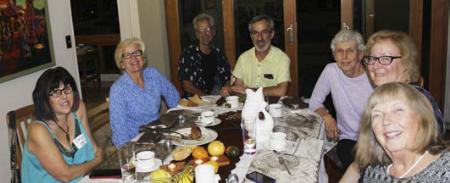
FROM SOUL MATTERS SHARING CIRCLE: What Does It Mean To Be a Community of Healing?
Well this one certainly seems easy to answer: it takes work. To be a community of healing requires dedication and a willingness to dig in — to fix what’s been broken, to listen away each others’ pain, to battle the bad guys and gals, to ask forgiveness when we are not the good guys and gals we so want to be. So yes, it is easy to remember that it takes work.
But what if we just as easily remembered that it takes perception and sight as well?
Or to be more exact, what if we remembered that healing always begins with perception and sight?
Would we more easily remember that time we were blessed with the experience of looking through each other’s eyes? It wasn’t a perfect view. We weren’t able to see or understand “the other” completely. But we were at least able to see them differently. And in doing so, the healing began.
Would we more easily remember the first time we felt seen? And how that made us want to give that gift to others?
Would we more easily call to mind those moments when we were able to see our “enemies” in their wholeness? Those moments when our frames of them as all bad and us as all good gave way to the truth that they are as complex, fragile and flawed as us.
Would we more easily tell the story of when we first realized that we were part of propping up the system? The system that subtly and not so subtly gives some a hand while keeping the hands of others so securely tied behind their back?
Would we more easily remember what happened when we confessed our lie or admitted our addiction? How when we stopped trying to hide it from the sight of others, it somehow loosened its hold on us?
There was a magic in all this looking, seeing and being seen. Remember that? In each case, we learned that healing is not entirely up to us. There was an otherness at work. We just got the ball rolling. We weren’t “the healers”; our wider view simply set the stage. Opened the door. Healing then slowly made its way in and joined us as a partner.
And seeing healing as a partner – rather than solely as a product of our will and work — we were able to be more gentle with ourselves. We realized that manageable steps and doing what we can were just fine; heroics didn’t always have to be the way. We were able to put down the weight of the world for a while, knowing and trusting that healing had a life of its own – that it has the ability to grow and take root even while we rest, maybe even because we took the time to rest.
In the end, maybe that is the most important thing to remember this month: besides always beginning with a wider view, healing also means making room for rest. Too often being a community of healing gets reduced to a matter of work, vigilance and never letting up. So we need these reminders that healing is a partner, not simply a product of our work.
Maybe even trying to partner with us right now…
— Rev. Scott Taylor for Soul Matters Sharing Circle
“You Tell on Yourself,” So No Use Faking
The Rev. Dr. Kikanza Nuri-Robbins said that, after she read this poem by Jamie Sidwell at Sunday Service September 18, many people asked her for a copy. Therefore she wants to share it, including via our newsletter. We thought this was an especially good idea given that over 80 of us were at de Benneville Pines that weekend, where we participated in a different Sunday Service. — Editor
You tell on yourself by the friends you seek,
By the very manner in which you speak,
By the way you employ your leisure time,
By the use you make of dollar and dime.You tell what you are by the things you wear,
By the spirit in which you your burdens bear;
By the kind of things at which you laugh,
By the records you play on the phonograph.You tell what you are by the way you walk;
By the things of which you delight to talk,
By the manner in which you bear defeat,
By so simple a thing as how you eat.By the books you choose from the well-filled shelf,
In these ways and more, you tell on yourself;
So there’s really no particle of sense
In an effort to keep up false pretense.
Quotes Related to Healing
Lois Hutchinson has provided these quotations that relate to our ministry theme for October.
The charities that soothe, and heal, and bless, Are scattered at the feet of Man — like flowers. — William Wordsworth
“I shall soon be rested,” said Fanny; “to sit in the shade on a fine day, and look upon verdure, is the most perfect refreshment.” — Jane Austen
There was no placid regimented tempo to Taps. The notes rose high in the air and hung above the quadrangle. They vibrated there, caressingly, filled with an infinite sadness, an endless patience, a pointless pride, the requiem and epitaph of the common soldier, who smelled like a common soldier, as a woman had once told him. They hovered like halos over the heads of sleeping men in the darkened barracks, turning all the grossness to the beauty that is the beauty of sympathy and understanding. Here we are, they said, you made us, now see us, don’t close your eyes and shudder at it; this beauty, and this sorrow, of things as they are. — James Jones
Now what reward for all this grief and toil? But one; a female friend’s endearing smile; A tender smile our sorrows’ only balm, And, in life’s tempest, the sad sailor’s calm. — Edward Young
The time for the healing of the wounds has come. The moment to bridge the chasms that divide us has come. The time to build is upon us. — Nelson Mandela
But noble souls, through dust and heat, Rise from disaster and defeat The stronger, And conscious still of the divine Within them, lie on earth supine No longer. — Henry Wadsworth Longfellow
Ernie Pipes Led Our Congregation to Embrace the Social Movements of the Era
 Ernest D. (Ernie) Pipes, Jr., who was born in Texas October 6, 1926, majored in Chemical Engineering at Rice University. After service in the US Navy in World War II, he majored in Philosophy and Social Services at Trinity University. He graduated in 1949 and married classmate Margaret (Maggie) Copeland. Ernie then studied
Ernest D. (Ernie) Pipes, Jr., who was born in Texas October 6, 1926, majored in Chemical Engineering at Rice University. After service in the US Navy in World War II, he majored in Philosophy and Social Services at Trinity University. He graduated in 1949 and married classmate Margaret (Maggie) Copeland. Ernie then studied
Philosophy in graduate school at Harvard, transferring after a year to Harvard Divinity School. He graduated in 1952, when he was called as minister of the First Unitarian Church in Albany, NY.
In 1956, Ernie accepted the call to ministry in Santa Monica and continued in our pulpit until his retirement in 1991, when he was confirmed as minister emeritus.
Ernie and Maggie’s three children grew up in our church. Bruce is married to Estralita Mendez; they have a daughter, Eliana, now at Columbia University. Gordon helps Ernie at home. Heather lives in Minnesota.
During their 35-year tenure, Ernie and Maggie led a congregation that was in the vanguard of the social, political and cultural ethos of the times. In the late 1950s, and I quote Ernie, “Long before we voted to become a welcoming congregation, we were perceived as one by the gay community.…I would be asked to officiate at a Holy Union of two people. My feeling, then as now, was that love is indiscriminate in its object…and it was my conviction that Unitarianism historically had been open-minded, dedicated not only to theological freedom, but also to personal freedom, human rights, and the option to be different.”
In 1965, Ernie responded to the call by Martin Luther King, Jr. to come to Selma in support of voting rights with a sermon that led the congregation to authorize Ernie and congregant Leon Papernow to go to Alabama. Their car was threatened, but they completed the last leg of the march into Montgomery.
In the 1960s and 70s, Ernie counseled conscientious objectors to the Vietnam War, the church voted to become a Peace Site, and Maggie and other church members supported Cesar Chavez and the farm workers in their efforts to unionize.
Prior to Roe vs. Wade in 1973, Ernie was among clergy members who counseled women on obtaining safe abortions. Ernie and Maggie were also board members of Sunset Hall, a retirement home for progressive elders started in the 1920s by the Women’s Alliance of First UU Church.
Reacting to the civil wars in Central America in the 1980s, our church became a Sanctuary Church and in 1986 bonded a family from Guatemala, with whom Maggie stayed in touch for decades.
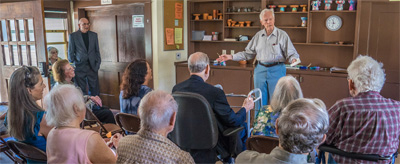 Throughout his ministry Ernie continued to study the history of ideas, comparative religion, and the nature of human consciousness. Ernie was first in our church to lead the stillpopular course “Building Your Own Theology.” In 1997, six years after his retirement, Ernie led a six-week discussion group of philosopher Ken Wilber’s “A Brief History of Everything.”
Throughout his ministry Ernie continued to study the history of ideas, comparative religion, and the nature of human consciousness. Ernie was first in our church to lead the stillpopular course “Building Your Own Theology.” In 1997, six years after his retirement, Ernie led a six-week discussion group of philosopher Ken Wilber’s “A Brief History of Everything.”
In 2007 Ernie led a four-week course on global warming. He remains a force to the congregation and to the children in Religious Education.
In 1991, church members, led by Betty and Ray Goodman, endowed the Pipes Lecture Fund to honor Ernie and Maggie Pipes for their 35 years of leadership.
— Diana Spears
Rev. Bill Schulz Will Deliver 25th Pipes Lecture
Sunday, October 23, 3 pm, in our Sanctuary
Admission free, reception to follow
The Pipes Lecture Committee is honored to welcome the Reverend Dr. William F. (Bill) Schulz as our 25th Anniversary Pipes Lecturer. Rev. Schulz was our premier speaker in 1992. In the intervening years he has served as president of the Unitarian Universalist Association, executive director of Amnesty International USA, and president and CEO of the Unitarian Universalist Service Committee.
Rev. Schulz, who has known and admired Ernie Pipes for decades, is traveling from Boston to join in honoring our reverend emeritus on his 90th birthday. His address, entitled, “Seeing the Garden, Not Just the Wall” discusses what we can learn from lives well led, working to overcome obstacles to humanitarian progress. A review of one of Rev. Schulz’s many publications, in the “New York Review of Books,” said, “William Schulz has done more than anyone in the American human rights movement to make human rights issues known in the United States.”
Please join us for this singular presentation. Questions may be directed to Patrick McGuire or Diana Spears of the Pipes Lecture Committee.
Letter from Camp de Benneville — and Letting Go of Interweave
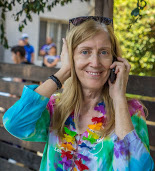 I’m sitting on the deck of the lodge with a gentle breeze blowing and the happy voices of UU kids playing in the background. It used to be the sound of my own kids and I realize I started coming to de Benneville 20 years ago, just after John-Michael turned five and Angela was not yet one.
I’m sitting on the deck of the lodge with a gentle breeze blowing and the happy voices of UU kids playing in the background. It used to be the sound of my own kids and I realize I started coming to de Benneville 20 years ago, just after John-Michael turned five and Angela was not yet one.
After beginning this glorious Saturday with a much-needed massage, I wandered into a mindful meditation group that led me from a quieting of the noise within to a deeply moving sharing of spirits and tears — human and spiritual connection at its best.
As I sat meditating silently, I promised myself I would write this letter. Life is good — I’m 63 years old, my kids are launching themselves nicely, and although I’ve considered retirement, I still work hard at a job I love. But I find myself wanting to experience more quiet time, more evenings and weekends with Karl, more time in my garden, more time cooking, and more time reflecting on everyday life. The voice within is telling me to slow down and let go.
For over a decade, I’ve been involved with Interweave, our LGBTQ group, putting together our Coming Out Sunday service in October, offering potlucks at our house, selling Pride t-shirts, and organizing our church’s participation in the Los Angeles Pride Parade. Of the many activities I’ve been involved in at UUCCSM, Interweave is perhaps the one I’m most proud of. What drives my passion is a desire to make this a place where every kid feels welcome, loved, safe and free to express who they are. And not just to feel accepted, but feel celebrated.
And yet, as proud as I am of my contribution, it’s time for me to pass the Interweave baton on to some other willing members of our church community. I’m not sure exactly who those members are (and I do emphasize the plural) but I know there are others who will be inspired to continue our work of standing on the side of love. Although I’m happy to share what I know with these new folks, I no longer wish to assume the responsibility of leadership.
Our annual Coming Out Sunday service is October 9, just a few short weeks from now, and I have made no plans. Today, in our meditation group, we were instructed to focus on an issue that is causing us unease and my mind settled on my struggle to make public my desire to step down from Interweave. Tears did bubble to the surface — letting go is never easy. But it is the truth and I acknowledge it — to myself and to you.
With affection,
Janet Goodwin
A Glorious Camp Weekend, 6,600 Feet Closer to Heaven
 Eighty-one of us, including many young children, climbed (well, drove) up the mountain October 16 to our church weekend at de Benneville Pines, the UUA Pacific Southwest District camp. From Friday evening through Sunday afternoon we hiked, swam, kayaked, tie-dyed, ate well, had a talent show and two wine tastings, deepened our ties with old friends and made new friends, did archery, worshipped, sketched, worked together to set and bus tables, and more.
Eighty-one of us, including many young children, climbed (well, drove) up the mountain October 16 to our church weekend at de Benneville Pines, the UUA Pacific Southwest District camp. From Friday evening through Sunday afternoon we hiked, swam, kayaked, tie-dyed, ate well, had a talent show and two wine tastings, deepened our ties with old friends and made new friends, did archery, worshipped, sketched, worked together to set and bus tables, and more.
We even had a news flash. Our camp “dean,” Jacki Weber, announced that she was leaving her job as chief development officer at Homeboy Industries to lead a three-year project at de Benneville Pines to raise funds and improve and expand operations and facilities (including improving access) to make the camp sustainable for decades to come.
I led a workshop on the difference between philosophical idealism and philosophical materialism. To my surprise, 15 people showed up. UUs are amazing. Just three of us, though, were up (literally) for a 6:30 am hike to Johns Meadow. My fellow early risers were Haygo Saliban and Bob Dietz.
Here are reflections from others:
Abby Arnold: This was my first time at our congregation’s annual camp, although I have been a church member for over 20 years and have been to de Benneville Pines many times to drop off and pick up my two sons, and have chaperoned teen camps. I loved having the time to get to know some of the newest members of our congregation, and some of the young families who represent the future of our church. I was also able to deepen my connections with longtime friends who I see on Sundays, but seldom at other times. At de Benneville we are connected to the holiness of nature, and at the same time we are connected to those with whom we share the Seven Principles. It was an uplifting weekend of renewal.
Lois Hutchinson: Even the birds and the chipmunks seemed to appreciate the early morning silence. A canopy of pine boughs served as our sanctuary for Sunday-morning services. I hiked to Jenks Lake with Rick Teplitz, where he took the photo on the next page. Many of us headed home resolved to return next year and encourage even more of our fellow congregants to join us.
— Rick Rhoads

Camp De Benneville Pines Weekend
At the Sunday worship service, Becky Erskine, a former professional musician who first started coming to our church in August, played the violin, as she had in the talent show. Joyce Holmen, Karl Lisovsky, and Jacki Weber sang, Camp Director Janet James made heartfelt remarks in appreciation of our congregation’s love of de Benneville, and Ian Oakes demonstrated balance.
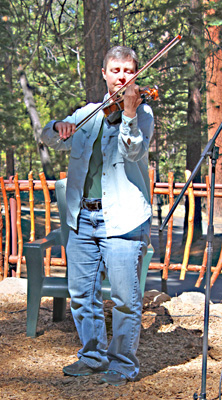

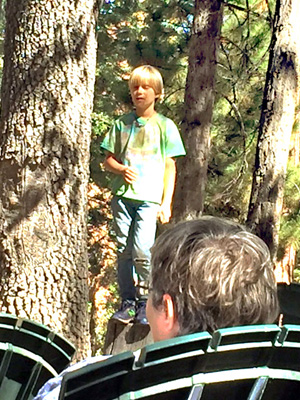
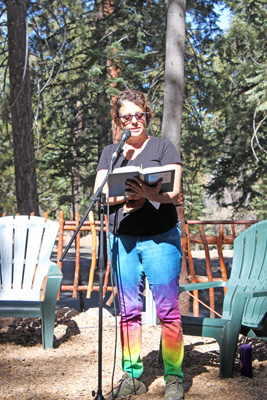


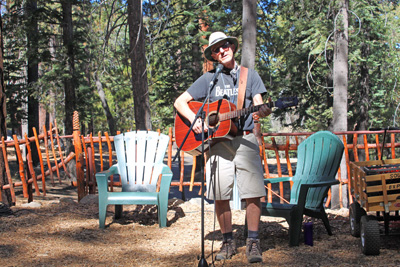
The Joy of Generosity

Since you get more joy out of giving joy to others, you should put a good deal of thought in the happiness that you are able to give. Eleanor Roosevelt
For it is in giving that we receive. St. Francis of Assisi
The best things to do with the best things in life is to give them away. Dorothy Day
The altruism center of the brain is considered a “deep brain structure.” Humans are social animals wired to help one another. Neuroscience has demonstrated that giving is a powerful pathway for creating more personal joy and improving overall health. Psychology Today: Neuroscience and the Basis of Happiness.
The wise one does not lay up his own treasures. The more he gives to others the more he has for his own. Lao Tzu
When we give cheerfully and accept gratefully, everyone is blessed. Maya Angelou
Our stewardship team is joyful to announce our communities’ theme for this year’s pledge campaign. The joy of generosity, it turns out, is not only a nice sentiment set forth by sages, religious leaders, our grandparents, kindergarten teachers and saints throughout the ages, but is also backed up by scientific research. So it turns out that when we give, not only does the receiver benefit, but the giver benefits far more.
Our community is precious to all of us. When we give from our hearts, we are supporting the ministry and programs that our church thrives on. We are supporting our children, our facilities, our music and our seniors. We are securing this church community’s future. We give to our church community since “service is our prayer” so that our community, in turn, can give service to the larger community that we live in and we can be an even more “generous congregation.” We support our social justice ministry by moving our “faith in action” out to the larger world.
Past President Ray Goodman Turns 96 September 6
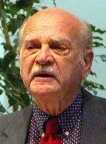 Ray was raised in a Jewish household where he learned fluent Hebrew and led a youth group at his synagogue in Chicago. He attended the University of Chicago School of Medicine and received postgraduate training in internal medicine at the Los Angeles County Hospital. His postgraduate training was interrupted by military service during World War II that included a stint as medical director of a U.S. Marine Hospital in northern China, and marriage to his wife Betty in 1943. After the war, Ray and Betty returned to California where he finished his medical training and started a private practice in Beverly Hills, where they raised their five children. Ray later obtained a Masters Degree in Public Health at UCLA and served as a member of the volunteer faculty in medicine and public health. In recent years he has been a major philanthropist for the UCLA School of Public Health. Thanks to his beneficence three students each year are awarded scholarships from the Ray and Betty Goodman bequest. Betty was a life-long Unitarian, with family members serving UU congregations as ministers. Thus, Ray became a Unitarian. He and Betty joined UUSM during the ministry of the Rev. Ernie Pipes. Ray served two terms as president in the late 1980s, and he played an important early role in fundraising efforts for upgrading our facilities in the early 1990s. Betty died about nine years ago, so Ray hasn't attended church as often as he did previously. But he remains a committed UU and member of this church. We are grateful for his many contributions to our congregational life.
Ray was raised in a Jewish household where he learned fluent Hebrew and led a youth group at his synagogue in Chicago. He attended the University of Chicago School of Medicine and received postgraduate training in internal medicine at the Los Angeles County Hospital. His postgraduate training was interrupted by military service during World War II that included a stint as medical director of a U.S. Marine Hospital in northern China, and marriage to his wife Betty in 1943. After the war, Ray and Betty returned to California where he finished his medical training and started a private practice in Beverly Hills, where they raised their five children. Ray later obtained a Masters Degree in Public Health at UCLA and served as a member of the volunteer faculty in medicine and public health. In recent years he has been a major philanthropist for the UCLA School of Public Health. Thanks to his beneficence three students each year are awarded scholarships from the Ray and Betty Goodman bequest. Betty was a life-long Unitarian, with family members serving UU congregations as ministers. Thus, Ray became a Unitarian. He and Betty joined UUSM during the ministry of the Rev. Ernie Pipes. Ray served two terms as president in the late 1980s, and he played an important early role in fundraising efforts for upgrading our facilities in the early 1990s. Betty died about nine years ago, so Ray hasn't attended church as often as he did previously. But he remains a committed UU and member of this church. We are grateful for his many contributions to our congregational life.Alice Hall Photographs Rev. Rebecca
 Rev. Rebecca and this newsletter thank church member and professional photographer Alice Hall for contributing the new photo of Rebecca that appears in her column.
Rev. Rebecca and this newsletter thank church member and professional photographer Alice Hall for contributing the new photo of Rebecca that appears in her column.Quotes About Covenant
Interweaving Alfresco
 Dozens of us congregated on the patio following the church service July 31 for the annual Interweave and Women’s Alliance Picnic. Our donations gave us delicious food from the grill and from tables abundant with salads, fruits and baked goods, and helped support The Trevor Project, the leading national organization providing crisis intervention and suicide prevention services to bisexual, gay, lesbian, transgender, and queer/
Dozens of us congregated on the patio following the church service July 31 for the annual Interweave and Women’s Alliance Picnic. Our donations gave us delicious food from the grill and from tables abundant with salads, fruits and baked goods, and helped support The Trevor Project, the leading national organization providing crisis intervention and suicide prevention services to bisexual, gay, lesbian, transgender, and queer/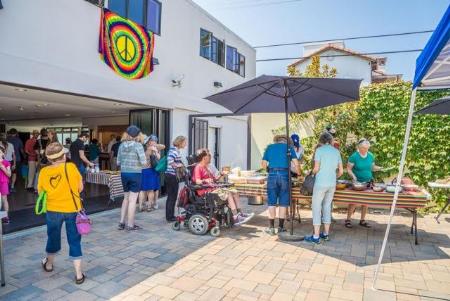
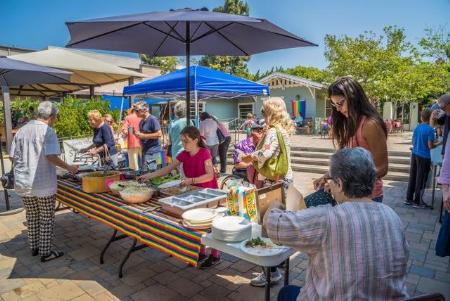
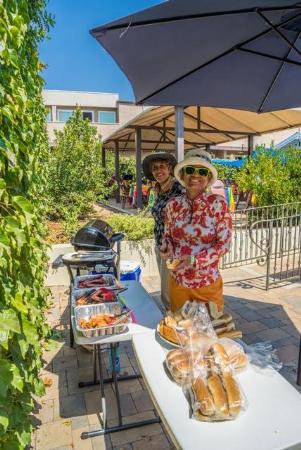

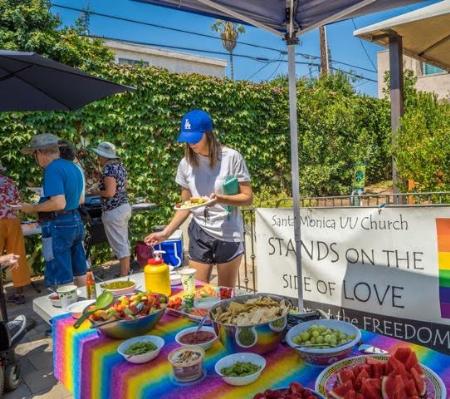
Support Legal Defense of UU Anti-racists
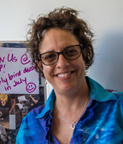 RIGHT RELATIONS - Practicing What It Means to Be Human
RIGHT RELATIONS - Practicing What It Means to Be Human
 All-Church Camp Weekend September 16-18, 2016 SIGN UP AT CHURCH OR ONLINE
All-Church Camp Weekend September 16-18, 2016 SIGN UP AT CHURCH OR ONLINE
 Prices start at $145/person for adults, $85/person for kids and $110 for teens, and that includes all food and activities for the weekend!
Prices start at $145/person for adults, $85/person for kids and $110 for teens, and that includes all food and activities for the weekend!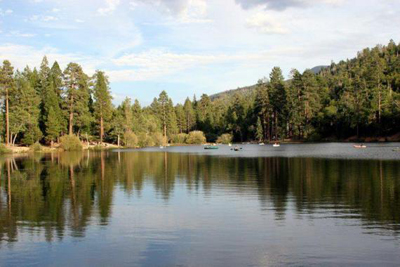 A Personal Note About Camp
A Personal Note About Camp I treasure these memories especially because they have enriched my life. I joined this church in part because I wanted to nourish intergenerational relationships. That is hard to do in 20 minutes between services. It’s easy to do when you’re eating and crafting and hiking and playing cards and worshiping together over a two-day weekend.
I treasure these memories especially because they have enriched my life. I joined this church in part because I wanted to nourish intergenerational relationships. That is hard to do in 20 minutes between services. It’s easy to do when you’re eating and crafting and hiking and playing cards and worshiping together over a two-day weekend. Camp de Benneville is kind of the best vacation home ever. It’s always full of interesting and diverse people ready to drop the mask of who they are “down the hill” and just be playful spirits for a few days.
Camp de Benneville is kind of the best vacation home ever. It’s always full of interesting and diverse people ready to drop the mask of who they are “down the hill” and just be playful spirits for a few days.Quotes About Vision:
Lois Hutchinson has provided these quotations that relate to our ministerial theme for July. They are attributed to the sources listed, but our fact-checking department has been unable to confirm authorship.
My religion is very simple. My religion is kindness. — The Dalai Lama
Peace among religions is a precondition for world peace. — Swami Agnivesh
No one is born hating another person because of the color of his skin, or his background, or his religion. People must learn to hate, and if they can learn to hate, they can be taught to love, for love comes more naturally to the human heart than its opposite. — Nelson Mandela
We are just passing through. Our purpose here is to observe, to learn, to grow, to love...and then we return home. — Australian Aboriginal saying
UU Role in Roe v. Wade
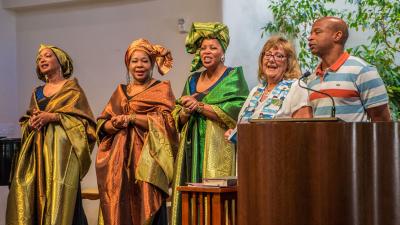 In her sermon here June 19, guest minister Rev. Lee Marie Sanchez included a little-known fact, even in UU circles. I’ll quote here a version from the UUA website:
In her sermon here June 19, guest minister Rev. Lee Marie Sanchez included a little-known fact, even in UU circles. I’ll quote here a version from the UUA website:2016 Annual Meeting and Elections - The Results Are In
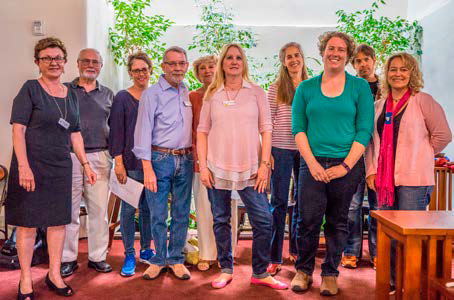 The size of the crowd filling the pews showed that a quorum was easily established for our 89th Annual Congregation Annual Meeting on May 22. In all, more than 225 members (that’s two thirds of our membership!) were represented in body, or in spirit through proxies and absentee ballots. Rev. Rebecca Benefiel Bijur opened the meeting with a chalice lighting, reading a passage from “Nothing is Static” by Rev. Manish Mishra-Marzetti. Here is an excerpt:
The size of the crowd filling the pews showed that a quorum was easily established for our 89th Annual Congregation Annual Meeting on May 22. In all, more than 225 members (that’s two thirds of our membership!) were represented in body, or in spirit through proxies and absentee ballots. Rev. Rebecca Benefiel Bijur opened the meeting with a chalice lighting, reading a passage from “Nothing is Static” by Rev. Manish Mishra-Marzetti. Here is an excerpt: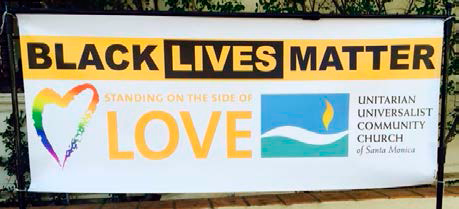 The motion to display a “Standing on the Side of Love/Black Lives Matter” banner sparked a higher level of controversy. James Witker and Cathie Gentile explained their motivations, stemming from UUA General Assembly last year and the efforts of other churches nationwide to continue to display “Black Lives Matter” banners, even though they are repeatedly defaced and destroyed. James and others offered that a banner supporting African American and LGBTQ rights explains what the congregation stands for; it would provide good publicity for the church and encourage diversity in the congregation. Support for the banner was voiced by Faith in Action members who are active in protesting local shootings.
The motion to display a “Standing on the Side of Love/Black Lives Matter” banner sparked a higher level of controversy. James Witker and Cathie Gentile explained their motivations, stemming from UUA General Assembly last year and the efforts of other churches nationwide to continue to display “Black Lives Matter” banners, even though they are repeatedly defaced and destroyed. James and others offered that a banner supporting African American and LGBTQ rights explains what the congregation stands for; it would provide good publicity for the church and encourage diversity in the congregation. Support for the banner was voiced by Faith in Action members who are active in protesting local shootings.Vice President (1-year term): Patrick Meighan 56; Jacki Weber (winner) 161
Secretary (1-year term): Phil Bonacich 65; Beth Brownlie (winner) 144
Treasurer (1-year term): Kim Miller (winner) 126; Bill Nunan 96
Members-at-Large (2) (2-year term): Jerry Gates (winner) 120; Kikanza Nuri-Robins (winner) 202; Herb Stahl 93
Nominating Committee (2) (3-year term): Melinda Ewen (winner) 127; Barbara Gibbs (winner) 189; JoAn Peters 121
 Pride: The Practice of Authenticity
Pride: The Practice of Authenticity
Values are principles and ideas that bring meaning to the seemingly mundane experience of life. A meaningful life that ultimately brings happiness and pride requires you to respond to temptations as well as challenges with honor, dignity, and courage.
— LAURA SCHLESSINGER
Quotes about Pride
 Bettye Barclay has provided this list of weekly thoughts about our ministerial theme for June. Daily quotes also appear in the weekly electronic announcements.
Bettye Barclay has provided this list of weekly thoughts about our ministerial theme for June. Daily quotes also appear in the weekly electronic announcements.
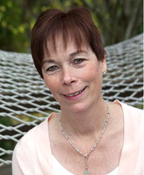 Right Relations Update - Congregational Task Force to meet with Consultant Nancy Edmundson
Right Relations Update - Congregational Task Force to meet with Consultant Nancy Edmundson
• Within the congregation, has credibility, and is seen as trustworthy by most (due to current conflict, the “by most” becomes important vs. “all”)
• Ability to listen and hear different points of view (with understanding as individuals within the group, they are likely to have different points of view on the current conflict)
• Good communicator
• Committed to a right relations process in the congregation without attachments to specific outcomes • In considering the “full task force” — members of the congregation can likely identify with or “see themselves” in someone on the task group.
• Available in May and early June for work on the task force
• One or two hour-long video/phone conferences
• To engage fully in the process, and consider a modest amount of reading material assigned by Nancy in support of the task force work
• Offer perspective and suggestions and feedback to Nancy about her congregational proposed activities
• Support in preparing and presenting a proposal of activities to the UU Santa Monica Board of Directors no later than June 14
• Support in communication with UU Santa Monica congregation
• Possible continuation on a longer-term task force (this task is not to be assumed)
• Possible continuation in the ongoing Right Relations conversations and activities, at a leadership level, not necessarily on the longer-term task force
Honoring Marguerite Spears on Her 99th Birthday
 Early on, Marguerite joined sit-ins to integrate eateries in Akron. In further McCarthy-era civil rights work she met Paul Robeson, Diego Rivera, and Frida Kahlo.
Early on, Marguerite joined sit-ins to integrate eateries in Akron. In further McCarthy-era civil rights work she met Paul Robeson, Diego Rivera, and Frida Kahlo.
 Introducing our Congregational Consultant, Nancy Edmundson
Introducing our Congregational Consultant, Nancy Edmundson
Nancy is Midwestern-born and raised with formal degrees in biology and physical therapy from the University of Nebraska, College of Medicine. In 1984 with her California-bred husband she transplanted to Santa Barbara, where they practiced physical therapy and raised their family. She has been a member of the Unitarian Society of Santa Barbara since 1990, and has enjoyed facilitating groups of children, youth, and adults in a variety of USSB programs and roles. She has served as a religious professional as the Director of Administration for the USSB for 10 years, and she has consulted with numerous congregations in a leadership development capacity and facilitated lay leadership development retreats. She has served the Pacific Southwest District in a variety of roles since 1991 and currently serves on the UUA Pacific Western Region Ministerial Transition Team. In 2012 she was honored with the Distinguished Service award from the Pacific Southwest District of the Unitarian Universalist Association. Nancy has been a Courage & Renewal® facilitator since 2012. Nancy has worked in community organizing for alternative education in the areas of charter schooling and homeschooling in California and has been instrumental in the development of an interfaith county-wide Warming Center program for unsheltered homeless in Santa Barbara County and currently serves on the board of PFLAG Santa Barbara.
I want to introduce myself to you and to say that I am humbly honored to work with your congregation at a time that is challenging for all. This is a tender and important time in your congregational life. I look forward to working with you to design and live into a process to begin to heal your divisions, and then move to identifying and clarifying other underlying issues. We will take this a step at time and adjust as we go. We will rebuild trust and healthy communication first, so that we may then turn to work on clarifying other important systems and processes that may need to be established or would benefit from clarification of process, roles, and accountability. This relationship will call upon all of us to fully engage in a spirit of good will, and I am privileged to journey with you in a supportive and consultative role.
— Nancy Edmundson
About “Right Relations”
When we talk about “right relationships” we refer to tending to relationships at all levels of congregational life — personal, interpersonal, institutional and cultural or ideological; creating and maintaining environments that inspire growth and transformation in order to support individuals and the congregation to live out our deepest, most life-affirming vision, mission, and values.
Your congregation is in a time of conflict. When we are in right relationship with one another we can welcome conflict as a natural part of healthy congregational life, and we can navigate and manage change (and congregations are always changing). If we lack information or skills for engaging constructively in conflict, or if we don’t have a foundation of right relationships, change and conflict can tear us apart. A process of right relations is designed help to bring us back to our better selves, and to listening and communicating deeply and respectfully to one another, even when we disagree. From this place we can begin to discover and articulate the core values of your unique congregation and articulate a covenant of right relations and processes to support and maintain that covenant.
In a congregation of human beings, there are always areas of difference, varying world views, opinions, prejudices, and strongly held, often contradictory, beliefs. For example, we may hear such things as, “You can’t talk about that (issue of your choice) here,” “Can I be a Christian here?”, “Can you be a Republican here?”, and “I’m pro-life. Am I welcome here?” In a congregation of right relations, openness about our personal truths is possible if we acknowledge the right and responsibility of others to share their different views.
What does right relations give us? When we find our congregation in conflict, we may have many reasons to doubt, to lose hope, and to despair of our own and others’ behaviors. Instead, we choose right relationships, to restore right relationships, and to stay attentive to maintaining right relationships. We choose to act as if people can be good and we can trust them. Trust them not blindly, not foolishly, but hopefully. We do this knowing that human beings are complex and that there are road blocks along the way. Then your congregation can become a life-affirming community where individuals can live out their best intentions, forgive themselves and others when necessary, and celebrate the gift of life and love in community.
— Nancy Edmundson
UUSM ELECTIONS 2016
A Letter from the Nominating Committee
Given the turmoil this spring, many people have asked how the Nominating Committee works and how we make nominations to the Board. The Nominating Committee is required by our bylaws to select nominees for the Board of Directors and the Nominating Committee. These nominees are voted on at the Annual Meeting.
The Nominating Committee consists of six members, each elected for a staggered three-year term, with two people elected every year. The entire committee turns over every three years. This structure, along with bylaws preventing the Board from directing the Nominating Committee, keeps the committee independent.
We discussed what qualities we should look for in filling Board positions and what procedures we should use. We also talked about these things with the Rev. Tera Little (our minister while Rebecca was on her sabbatical), we talked with individual members of our congregation, and recently one of our members talked with the Rev. Ken Brown (the head of the March Report on the Congregational Conversations).
Our criteria for picking Board members this year emphasized leaders who have vision, listen and communicate well, deal effectively with conflict, have been active in the church, are capable of taking on the primary responsibility for running the church, and follow through on issues. We believe it’s imperative for the Board (along with everyone else) to have a long-range vision for our church that creates a growing community that helps individuals with their spiritual growth, helps give our children a good start on life, helps our church set its priorities, gives everyone a voice, and helps us thrive and interact with the wider world. To accomplish these aspirations we looked for potential Board Members who:
• are active in the church,
• make a financial contribution to the church,
• tend to attend services,
• are able to express their ideas clearly,
• are able to work effectively with a wide variety of people,
• can handle conflict and are able to understand a larger picture than their own,
• can inspire members to take an active role, and
• are excited by our UU beliefs and mission and can communicate that excitement to others.
Some members of the congregation recommended that we nominate more than one person per open position for the Board. Nominating only one person for each position may feel undemocratic. But, after Tera announced to the congregation her recommendations to get help healing deep conflicts, we decided it would be divisive to change the procedure of the last several years. We decided to nominate the one best candidate we could find for each position. We later found out that 90 percent of UU churches follow this procedure. In the middle of April we sent an email to the congregation that outlined procedures members could take to become nominees by petition for the Board of Directors or the Nominating Committee. The petitions have to be submitted to the office by May 2, 2016, and be validated by the Secretary of the Board. See our Church Bylaws, Article XII Nominations.
The final ballot and a statement from all candidates will be included in the election packet that will be prepared by the church office and sent out to all members before the election.
— Nominating Committee members: Beth Rendeiro, Bob Dietz, Gretchen Goetz (chair), James Witker, Rick Rhoads, Wendi Gladstone
Choice and Elections:
An opinion on “Choice” as we prepare for elections at our Annual Meeting
I have been active at UUSM for more than twenty years. In all that time, there have been two other contested elections, including the one for the Settled Minister Search Committee established after the Rev. Judith Meyer’s departure. In the spirit of “more democracy is better,” I appreciate the efforts by our congregation to create more choice on this year’s ballot. I respect the hard work of the Nominating Committee (I’ve been there!) and the community members the committee has put forth for election. I also respect the congregants who’ve said they would like to see other options for leadership and applaud those that have stepped forward.
Several people have reminded me in the last few weeks that, in the longstanding tradition of Unitarian Universalist congregations, our strength is rooted in our commitment to diversity. We are a community of atheists, theists, and everything in between. Our congregation encompasses young and old, newcomers and veteran UUs, gay, straight, and transgendered people of many colors and even more traditions. We are that way today, we will be that way when we are voting at our Annual Meeting, and we will continue to be that way afterwards. We need to remember to respect diversity and each other, and not create winners and losers.
I assume that each candidate who will be on the ballot (whether put forth by the Nominating Committee or by petition) has stepped forward with an offer to help lead us into better community with one another. I expect each will continue to contribute to our community regardless of the election results. Indeed, each of us has a role to play in advancing our UU values as members and leaders.
A dozen years ago, James Surowiecki authored the book, “The Wisdom of Crowds: Why the Many Are Smarter Than the Few and How Collective Wisdom Shapes Business, Economies, Societies and Nations.” In it, he lays out the case that “a diverse collection of independently deciding individuals is likely to make certain types of decisions and predictions better than individuals, or even experts.” (With no irony, I will tell you that sentence is lifted straight from Wikipedia!) This theory applies to the process of our collective congregational decision making. Together, we are wiser than we think.
— Pam Teplitz
An opinion about one consequence of our contested elections
I support democratic practices; in fact, one of the values that is most attractive about our community is that we discuss, we debate, and we vote about everything. However, I am concerned about one consequence of the contested elections for the board of directors.
There is currently a sharp division in our community between those concerned about congregational leadership. Aware of this division, the Nominations Committee, while nominating one candidate for each position, produced a slate that included people positioned on both sides of the divide. In contrast, the contested election will involve each of us debating how each candidate is positioned.
Contested elections may be democratic but in this case, they will be divisive. Being aware of this is important as our community works toward right relations.
— Vilma Ortiz
The UUSM Election Process According to Our By-laws
PETITION CANDIDATES:
The deadline for submitting 10 signatures of verified members of the congregation in support of a candidate is 20 days before the election, Monday, May 2. Submit to the office along with a maximum 200-word candidate statement in person, by fax (310-998-9181), or email (admin@ uusm.org).
ANNUAL MEETING AND ELECTION PACKETS:
The Board and office are preparing an Annual Meeting mailing that will include photos and candidate statements by all candidates. The mailing will also include information on the proposed 2016-2017 budget and other resolutions requiring a congregational vote. It should arrive by Tuesday, May 10. If you do not receive it or you perceive any problems, please contact the office.
ABSENTEE BALLOTS:
Voting members of the Church who do not expect to be present at the Annual Meeting on Sunday, May 22 may vote in absentia in either of two ways:
1) by designating another voting member, who will attend the meeting, as his or her proxy. No member is allowed to hold the proxy for more than one absent member. There is a form to complete that the proxy presents when signing in for the meeting; or
2) by completing and submitting an absentee ballot. Please return the absentee ballot to the church office and place in the church administrator’s mailbox (do not leave it on a desk) in an envelope marked “Absentee Ballot” with your name on the outside. Deadline for submitting absentee ballots to the church office is Friday, May 20, at noon. Both the proxy form and the absentee ballot will available in the front office beginning Friday, May 8.

Riveting Town Hall Meeting on Congregational Conversations
By Lois Hutchinson
The pews were packed and the atmosphere was charged at the March 20 Town hall to discuss the summary report on Congregational Conversations. Comments ranged from What the heck is going on? to Finally, we’re talking about this! Many expressed surprise at the recommendations proposed by the UUA Pacific Western Regional staff and called for deeper listening and greater understanding. The congregation’s deep divides and occasional rancor were recognized, overlaid with a tone of sadness. UUA’s Rev. Ken Brown was on hand to moderate the meeting and explain the motivations behind the recommendations.
No official business was conducted at the meeting. Members of the UUSM Board of Directors will use the feedback from congregants to inform discussions on how to move forward. Rev. Rebecca Benefiel Bijur was not present.
Rev. Ken began the meeting with a reassuring chalice lighting: words on covenants by Janice Marie Johnson (excerpt): “Our covenant stands firm. It is our embodiment of faith in each other. It is our blessing of each other. It is our commitment to each other.”
Sue Stoyanoff, cochair of the Committee on Ministry, explained the path that led to Congregational Conversations facilitated by UUA. She described rising voices of conflict and unhappiness. This led the committee to recommend, and the board to move forward with, a series of Congregational Conversations to allow members to express feelings, both happiness and disappointedness.
In February, 23 groups gathered feedback from fully half the membership. The goal was to use deep, respectful listening (no crosstalk) to move toward inclusion, communication and compassion. The questions were broad but simple, and members were asked to speak only from their personal experience and opinions.
The UUA staff prepared a summary report and recommendations, which was presented to the UUSM board and disseminated to the membership via email in mid-March. [Copies of the summary report and recommendations are available from the UUSM office.]
Sue expressed the entire committee’s sadness at the report’s recommendations. But the committee does agree with the report that the congregation is deeply divided.
Queuing up
Overall the commenters “spoke their own truths” and the audience was very respectful of speakers, applauding politely or enthusiastically, as they were so moved. Time limits were, by and large, respected and sometimes enforced by cutting the audio feed from the microphone.
Rev. Ken presented the report as a reflection of what UUA heard from congregants. The recommendations were formed by consensus of the UUA team and their long experience. He warned that deep work needs to be done by our congregation to heal and reconcile.
He explained the report’s most significant recommendation: that Rev. Rebecca conclude her ministry at UUSM. The report is about the congregation, but Rev. Rebecca has become a lightning rod. The UUA staffers believe in Rev. Rebecca and support her, Rev. Ken said, and she deserves a congregation that will support her work and career. He hopes we will follow the majority of the report’s recommendations. In response to a question from the floor, Rev. Ken described this type of rift as common among UU congregations.
Jacki Weber was first to the mic. She read an open letter to the UUSM leadership signed by 35 members. The letter requested more open communication and future town halls; along with deeper self-knowledge, vision and support of staff and volunteers. Attached to the open letter were 20+ personal messages that Jackie received from congregants; some who were not able to attend the Town Hall. Copies of the open letter and personal messages were distributed, and are available from the UUSM office.
Tom Peters spoke next as cochair of the Committee on Ministry. He recognized that while turnout for the Congregational Conversations was good, 150 people weren’t there to provide their input. He had observed several of the Congregational Conversations and considers them to be steps forward in coming together and feeing heard. He saw pain among the attendees, and he has seen that Rev. Rebecca has been hurt, too.
One congregant questioned Rev. Ken on why the UUA did not intervene to address these problems earlier. (The UUA summary report cites this delay as a factor in deepening our divisions.) Rev. Ken responded that UUA cannot provide its support to a congregation until invited by church leadership.
Later, Treasurer Kim Miller relayed a message from Vice President Dan Nannini: the Town Hall is about long-term relationships; about more than one issue, more than one moment. He is open to listening. Kim agreed with Dan on the need to listen more openly. Everyone, including herself, should cease the blaming and name-calling. It is unhelpful, she explained.
One member asked Rev. Ken to elaborate on the snippets of grievances that appear in the report. Rev. Ken responded that there is a great deal of documentation containing a range of opinions. Ken cited his experience in conflict resolution and 42 years as a minister; during which he’s completed about 30 of these analyses. And it is typical that people are surprised.
He explained that an activated 20 percent of the congregation makes the decisions about congregational life. Perhaps this is a wake-up call for more members to provide their vision of the kind of congregation that members need. UUA has provided a clear path, so the congregation can move forward. But the decisions lie with Rev. Rebecca and the board. The UUA staffers believe that it would to be difficult for UUSM to move forward with Rebecca. He said that Rev. Rebecca needs a congregation that is willing to move forward, and he does not see a strong willingness at UUSM.
The decision is really hers and the board’s, Rev. Ken said. Sunday Sexton Tom Ahern asked whether the congregation would be asked to vote on the issue. The answer was not clear.
Though he recently announced his departure, UUSM Music Director DeReau Farrar spoke as a staff member, not as a member of the congregation. He pointed out that no one is talking about sexism and racism and ageism and classism in this church. He stated that UUSM is not a safe space for staff to work well and thrive. The congregants should look to themselves and how they have failed to serve the minister and the staff.
DeReau spoke again, later, in praise of Rev. Rebecca as a coworker and respectful leader. He pointed out that the church staff is underpaid, but that is the decision of the congregation who pledge and vote on the budget. He also mentioned that the policy excluding UUSM staff from membership is a board policy, not a personnel decision made by Rev. Rebecca.
Director of Religious Education Catherine Loya agreed: It is difficult to serve this community and not have my own needs be met, she said. But she does support that board policy. As an employee she has felt supported by Rev. Rebecca and finds her “incredibly collegial.” This community needs to decide whether we’re serious about our values, she admonished. We can come for an hour, or be serious about Unitarian Universalism and how we treat one another here. This has been a tough week, she said, but I am choosing hope.
For hours, congregants queued up to speak their piece, to call for deep listening, civility, and understanding, and to ask questions.
Though many expressed dismay at a surprising level of dissatisfaction, some spoke very specifically to their own disappointments. They named faults in Rev. Rebecca’s leadership or a management style, and mourned those members who have fallen away. Other speakers countered that five years ago Rev. Rebecca committed to us and we to her; she was hired fresh out of university and therefore deserves patience and support from the lay leadership and the congregation.
A few credited the professionalism and experience of the UUA staffers, or expressed direct support for implementing the UUA recommendations for change. Others enjoy deep satisfaction with their church life and with Rev. Rebecca. They generally feel that a frustrated minority can be heard and accommodated. Individual members expressed support for programs like Faith in Action and Religious Education, and some expressed devotion to UUSM as an institution or to the congregation, using words like home and family.
Several laid blame on leadership, both the Board of Directors and Rev. Rebecca, citing dysfunction, a systemic lack of vision, non-inclusiveness, intolerance, or lack of transparency. Just a few brought forth proposals for compromise or community self-examination. Some members called for a recommitment to our seven principles, to our unifying covenant and to our children.
Conclusion
In his conclusion, Rev. Ken referred again to our covenant: how we come together is what makes us different. He called the congregation back to our covenant, back to our best selves, as we come together to work for the future of this organization. He asked us to question who we are as a congregation. We have a representative democracy at UUSM, and it can be messy. He asked us to trust our leadership and give them space to lead.
When we call a minister, particularly a young minister, there is going to be work and change, he explained. But the UUA Pacific Western Regional staff will be with us as we move forward.
Author’s note: the meeting was not recorded on audio or video. Speakers’ comments are paraphrased from my notes taken at the meeting.
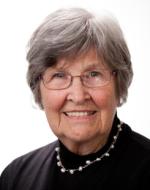 Quotes about Covenant: “What Binds Us”
Quotes about Covenant: “What Binds Us”
Bettye Barclay has provided this list of quotes about our ministerial theme for May. Daily quotes also appear in the weekly electronic announcements.
Week 1. What is a covenant? Here’s a definition that I learned years ago while training to be a New Congregation start-up minister. “Covenant is the central unifying promise or commitment that binds a religious community together in voluntary loyalty. It grows from an affirmation of shared needs, values, purposes and principles. As such it is rooted in the past, in the tradition of the congregation, and reflects the embodiment of the promise through history. It is a promise made in the present, with implications for the future” — Rev. Roberta Finkelstein
Week 2. Love always creates, it never destroys. In this lies man’s only promise. — Leo Buscaglia
Week 3. Dr. King’s leadership reaffirmed the promise of our democracy: that everyday people, working together, have the power to change our government and our institutions for the better. — Maria Cantwell
Week 4. The deepest depth of vulgarism is that of setting up money as the ark of the covenant. — Thomas Carlyle
Week 5. Mindful of truth ever exceeding our knowledge, of love and compassion ever exceeding our practice, reverently we covenant together, beginning with ourselves as we are, to share the strength of integrity and the heritage of the spirit, in humanity’s unending quest for reality and love. — Walter Royal Jones
IMPORTANT NOTICE!
You may have received by now the UUA’s Report on our Congregational Conversations held in February. After it was published on March 14, we held a Town Hall with UUA representative Ken Brown at UU Santa Monica on March 20. Response to the report has been overwhelming. Our Board and minister are committed to working with the congregation to determine whether and how to implement the recommendations. You can request a copy of the report from the church office. You can also request a copy of “Responding to the UUA Report,” an open letter to leadership with support and comments from 40+ congregants put together for the Town Hall. To keep abreast of developments, email pathforward@uusm.org
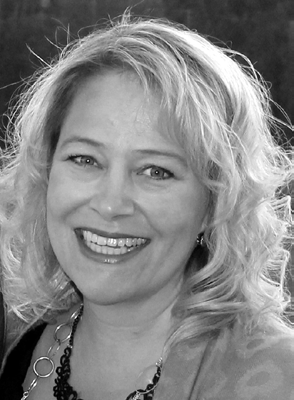 Leadership and our Path Forward
Leadership and our Path Forward
How our Board of Directors figures in implementing UUA Staff recommendations (or not) and how the UUA might be helpful
REPRINTED FROM UUA.ORG/SAFE/CONFLICT
Managing Conflict
 Quotes about Transformation
Quotes about Transformation


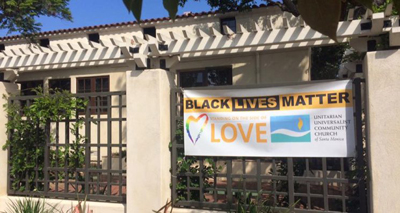
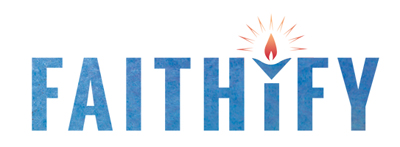 www.faithify.org/projects/support-uu-anti-racists/
www.faithify.org/projects/support-uu-anti-racists/